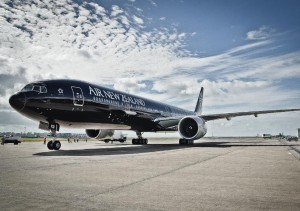Hats off to Air New Zealand on two counts…
1. The airline has just been recognised as having the best safety record in the world. Bravo!
2. The airline truly understands how to create brand advocates out of a negative customer experience situation. Commendable!

What happened?
An aeroplane bound for Auckland from Hawaii has been grounded for two days by a technical fault. As I write this, it’s still sitting on the tarmac. The airline has acted decisively in compensating customers stuck in Hawaii with NZ$1,000 cash [approx. US$850]. The compensation has been announced before the Auckland-bound flight has left the ground.
Why am I posting this?
Clearly evident in this example are some commercially-sound success principles in brand and customer management that apply to all brands. Yours included!
Let’s quickly consider the commercial value of taking this type of decisive action.
1. Businesses and brands which successfully create customers who become strong brand advocates, typically grow more than twice as fast as those which don’t.
2. Customers who are strong advocates for the brand, not only recommend it to colleagues/friends but crucially they:
- have the highest lifetime value of all customers;
- are less sensitive to price as an influence in their purchase decisions;
- are the most receptive to buying new products and services.
These customers can embed sustainable profitable growth into your brand and business. So, it’s an understatement to say that they are worth creating and retaining.
3. The single largest creator of brand advocacy is proven to be a brand’s ability to surprise and delight its customers/consumers/clients. So, the power of surprising and delighting any customer shouldn’t be underestimated. It just needs to be pitched commercially.
How?
By using the investment principle of customer lifetime value (their worth in sales and profit terms over their ‘lifetime’ with the brand) and calculating the acquisition investment that’s appropriate for each customer group, (how much the brand is willing to invest in acquiring each customer). Simple but immensely powerful when used to inform marketing investment and the appropriate amount to compensate customers after a poor experience with the brand.
So, back to the Air New Zealand example:
1. When something goes wrong and it negatively impacts the customer experience, the brand should take responsibility for managing its reputation by turning that customer experience into a positive perception of and relationship with the brand.
How? By genuinely apologising and creating surprise and delight…commercially.
Also – Do this very quickly. It shows the brand genuinely cares about inconveniencing its customers and knows what it needs to do to set the record straight.
Air New Zealand clearly recognises the importance of managing the customer experience. The airline has a general manager of customer experience – Carrie Hurihanganui.
Crucially, Carrie is empowered to manage brand reputation – i.e. actively manage the customer’s perception of the brand. Here’s what Carrie said;
“Due to the lengthy nature of this disruption, the difficulty we’ve experienced in adequately communicating with customers and the fact we have repeatedly let them down, we have made the decision that in addition to our unreserved apology we will also be compensating each customer, NZ£1,000.”
No doubt that Air New Zealand know all about customer lifetime value and acquisition costs to inform the basis for NZ$1,000 compensation. Irrespective of this, the airline is clearly focused on the creation of customers who become strong brand advocates; especially if they are born out of a negative situation.
So, a thought for you…
If something goes wrong with your brand’s customer experience, how might your brand create customers who become strong advocates? What could surprise and delight look like for these customers? How much should be invested to achieve it?
Here’s to your brand’s success!





